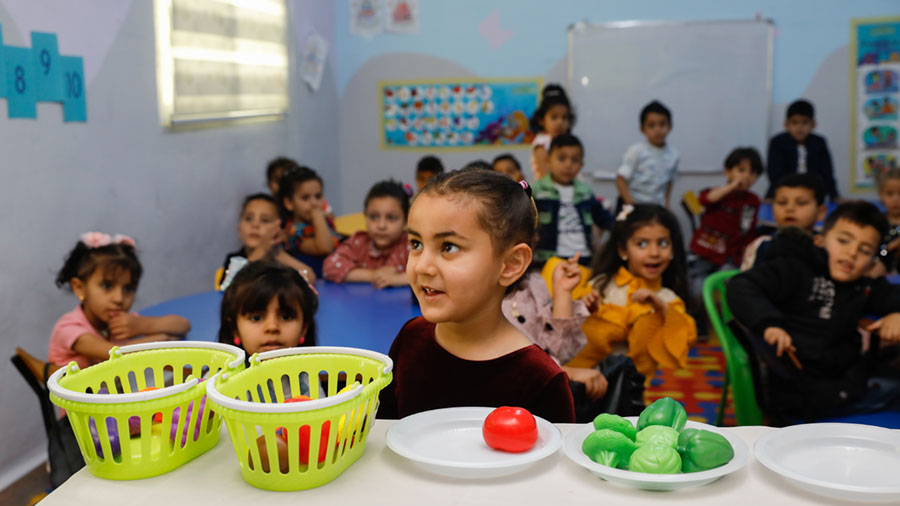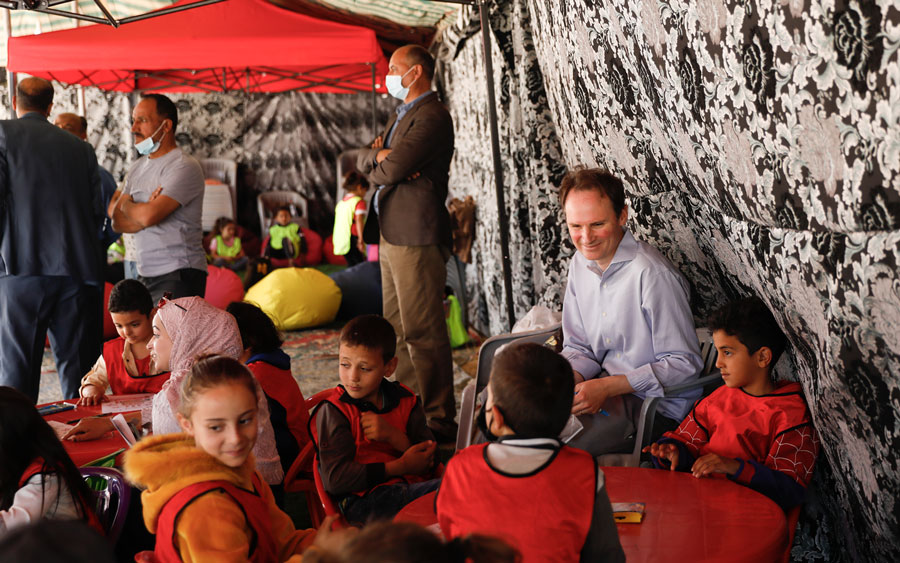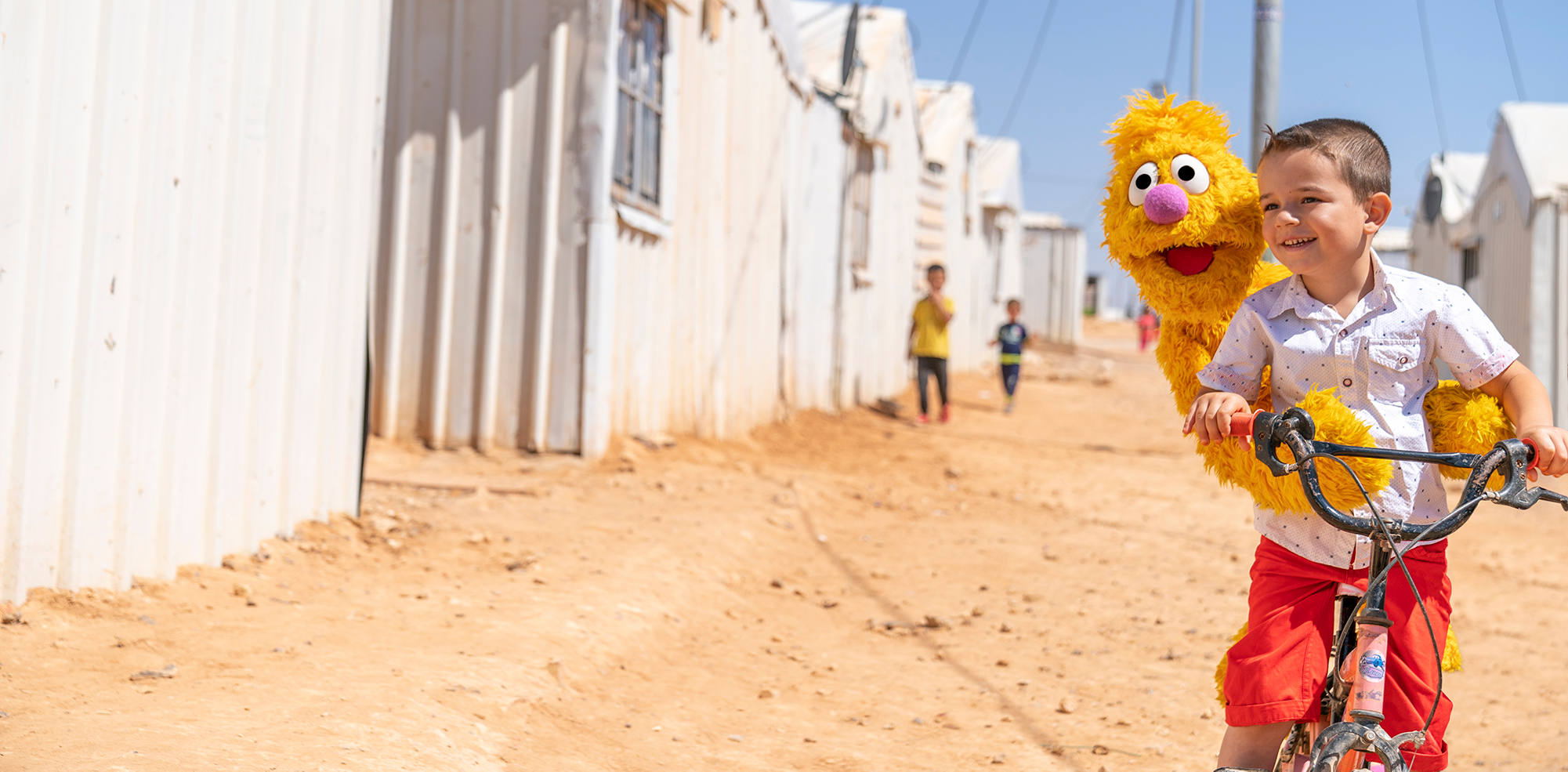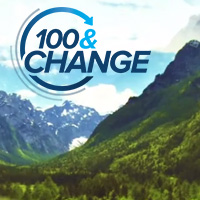Five years ago, a plan to help children cope with the distress of the Syrian war received $100 million. Today, the program has reached millions of children and parents across the Middle East and North Africa with a new Sesame Street show, healthy development, and early learning toward a resilient and thriving future.
In June, Samera Zaidi, Director of International Research and Evaluation at Sesame Workshop, was meeting with families to gather feedback about characters and storylines planned for Ahlan Simsim, the Arabic-language version of Sesame Street for children in the Middle East and North Africa (MENA). A new character, Ameera, is a girl who uses a wheelchair and crutches to navigate the world.
Ameera resonated with one mother who, like many families at the gathering, was living in temporary housing in Lebanon after she fled the Syrian conflict. She approached the researcher and told of her young son who had lost part of his arm during the conflict.
“It meant so much to this mom to have her son see this representational character be part of the story and feel that others are like him,” recalled René Celaya, Vice President for Humanitarian Programs at Sesame Workshop and Managing Director of the Ahlan Simsim project. “It was a tiny moment but some of these tiny moments capture the essence and intent of our work.”
A behind-the-scenes look into the creation of Ahlan Simsim, an Arabic-language version of Sesame Street created for children across the Middle East.
Five years ago, Ahlan Simsim, “Welcome Sesame” in Arabic, was selected from nearly 2,000 proposals to receive $100 million in MacArthur's first 100&Change competition for a $100 million grant to fund a single proposal that promises real and measurable progress in solving a critical problem of our time.
Ahlan Simsim is a collaboration between the popular children’s educational media organization Sesame Workshop and the International Rescue Committee (IRC), an international humanitarian organization. The award-winning project for 100&Change called for promoting critical early childhood development (ECD), including vital social-emotional learning, for children affected by conflict in Syria and the surrounding region.
Recognizing the potential of combining mass media and targeted direct services, the organizations teamed up to leverage their strengths. Sesame Workshop would create a new show, Ahlan Simsim, featuring familiar-looking, shaggy, colorful Sesame Muppets. IRC would deliver ECD programs and services for children and caregivers, integrating and leveraging Sesame Workshop’s educational content and characters. Eventually, these programs would be scaled up in collaboration with national governments and local partners for long-term, sustained impact.
Five years later, Ahlan Simsim is a complex network of individuals, families, community organizations, schools, and national ministries of education, health, and social development across Iraq, Jordan, Lebanon, Syria, and elsewhere around the world. The program’s services are embedded in national systems, and the show has aired for six seasons, broadcast across the MENA, and is available on YouTube and other platforms. Ahlan Simsim also has a comprehensive research component.
The work supports early learning from letters and numbers to managing emotions associated with the impacts of disruptive events such as large-scale conflicts and crises.
Over 23 million children in 22 countries across the region watch Ahlan Simsim on televisions and mobile devices. In addition, critical Ahlan Simsim ECD services—including playful learning and nurturing care programs that IRC and partners provide—have reached a million children and caregivers via remote delivery and in centers, classrooms, and clinics in Iraq, Jordan, Lebanon, and Syria.
The research component is a partnership between New York University’s Global TIES for Children and Ahlan Simsim that aims to double the existing evidence on what ECD programs are most effective in crisis settings. The findings, expected at the end of 2022 and mid-2023, will be shared with the wider humanitarian and development communities, key partners, and other stakeholders.
The sharing of learnings is a key part of Ahlan Simsim's commitment to contributing meaningful learning to the field and plans to provide scalable models that can be replicated and used wherever and whenever children and families are affected by conflict or crisis.
All of it—the mass media offerings, targeted direct services, and extensive research—has made Ahlan Simsim the largest ECD intervention in the history of humanitarian response.
Opportunities, Challenges, and Changes
When the Foundation’s decision was announced in December 2017, Sesame Workshop tweeted that it was “thrilled and honored” to have received the grant. IRC President and CEO David Miliband told the Chicago Tribune the support “will create a model for investment in early childhood services around the world.”
As exciting as the award was, it produced a wide array of possibilities and substantial challenges.
For one, a pilot project created about a year before the announcement of the 100&Change challenge was administering support to Syrian families in Jordan. After Sesame Workshop and IRC received the grant, the collaborative expanded that work—partnering with national ministries of education, health, and social development—to begin serving families affected by displacement and crisis in Iraq, Lebanon, and Syria.
Other formal and informal collaborations of all sizes also have been established, creating effective networks and addressing children’s development needs in their important early years.
“What we’re seeing is this amazing combination of partners within countries connecting and learning across the program region,” Celaya said. “And the show is reaching all households that can watch in the wider Middle East and North Africa. Those dimensions are really fascinating.”
Other unforeseen benefits have emerged from connections made at all levels—from families and small communities to large nongovernmental organizations and governments.
“The grant has given us the opportunity to find and work with amazing people within other organizations,” Celaya said. “It also has allowed us to bring amazing people into the work. That has been a wonderful opportunity.”
In addition, the $100 million was the first time the Sesame Workshop-IRC partnership experienced long-term, trusting, and flexible financing, said Marianne Stone, IRC Regional Project Director for Ahlan Simsim.
“Now I say to donors very openly, if you want to see actual transformative impact, donors across the board need to rethink their position on agility and flexibility,” Stone said, adding that funders need to reconsider existing models to create a long-term, flexible structure for all grantees, not only Ahlan Simsim.
Also fascinating, Celaya said, are the organizational challenges the grant has presented.
Sesame Workshop and IRC, which traditionally have structured projects around individual countries and regions within countries, had to make major adaptations internally and with partners to accommodate Ahlan Simsim’s multi-country approach.
They also had to weave the work of the sizable, multi-year grant into ongoing initiatives at both organizations.
“It challenged a lot of organizational assumptions,” Celaya said, “and it challenged a lot of the external relations implications with partners and governments.”
Managing those relations was “a twist” that has succeeded largely through building on relationships both organizations already had in place, he said.

Children participate in an Ahlan Simsim educational game at a community-based organization in Al-Karak, Jordan. Photo by Sarah Nasser/Sesame Workshop
New Donors Responding
Then there’s the $100 million question, which surfaces from time-to-time and goes something like this: Ahlan Simsim received $100 million. It does not need more money, right?
Celaya acknowledged that it is a fair question that at times has been difficult to explain inside the organizations and externally.
He noted that Ahlan Simsim covers four countries, delivers its work on multiple levels with multiple organizations and partners, produces several seasons of the show, and includes a comprehensive research element.
Beyond that, COVID-19 made the work much more challenging in 2020 and 2021, prompting the Sesame-IRC partnership to extend the original five-year length of the grant to six years.
Effectively running an initiative of that scope, depth, and complexity has required a sizable investment, Celaya said, and will require more.
“It seems like a lot of money, and it is,” he said. “One hundred million is enough to achieve a lot of wonderful things. But it is allocated to achieving certain goals with respective budgets.”
Unfortunately, Celaya said, according to the UN, over six million children in the region are still in need and 27 percent of those young people are at risk of poor development. Both organizations have been proactive in communicating what has been achieved with funding and what’s possible with more, he said.
“We want to reach more children within these countries and explore possibilities to reach out to children in other countries in the Middle East and North Africa.”
Donors have responded. About 14 have joined the work, contributing more than $200 million in funding beyond the $100 million from 100&Change, Celaya added.
‘Ripple Effects’
Looking to the future, Celaya and Stone said they plan to continue developing Ahlan Simsim content and program services that might be tailored to specific regions and adding cognitive skills to the social-emotional learning at the heart of the initiative.
They know that Ahlan Simsim’s legacy is embedding itself, as the partnership prepares to launch a seventh season of the show in the spring, and government partnerships are integrating the program’s services into national systems. Previous episodes of Ahlan Simsim will continue to be available on YouTube. Also, program content—including books, curricula, lessons, and activity materials—will be publicly accessible.
Parents, caregivers, teachers, small organizations, and large institutions have embraced Ahlan Simsim’s approaches to make these especially vulnerable children more resilient. Those children will carry those skills with them for the rest of their lives and pass them on to others.
“We hope that these are the ripple effects that will last beyond the life of the project,” Stone said.
Celaya and Stone continue collecting small, meaningful stories that demonstrate the power of Ahlan Simsim’s work.

McArthur President John Palfrey visits with Ahlan Simsim participants in Al-Karak, Jordan. Photo by Sarah Nasser/Sesame Workshop.
Like the moment that arose in May during a visit from MacArthur Foundation representatives to Jordan. They asked families gathered for a meeting to describe what Ahlan Simsim meant to them.
A mother shared how her family watched an episode of the show at home then went to a community-based organization where her children received ECD programming using Ahlan Simsim. The children heard the same themes and saw the same characters they had watched on the show earlier.
The continuity of Ahlan Simsim messaging through both those experiences, the mother said, brought joy to her children and sparked an interest in learning.
“Hearing how the knowledge sets of these two organizations came together for a family in very concrete, simple terms,” Celaya said, “that was really a special moment for me.”
This story originally appeared on the Lever for Change blog.
View the Sesame Workshop and International Rescue Committee's awardee profile ›




